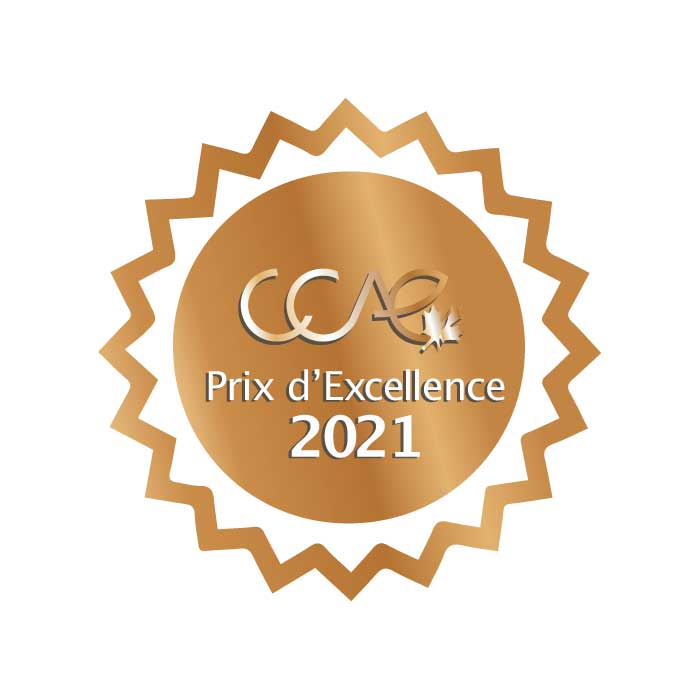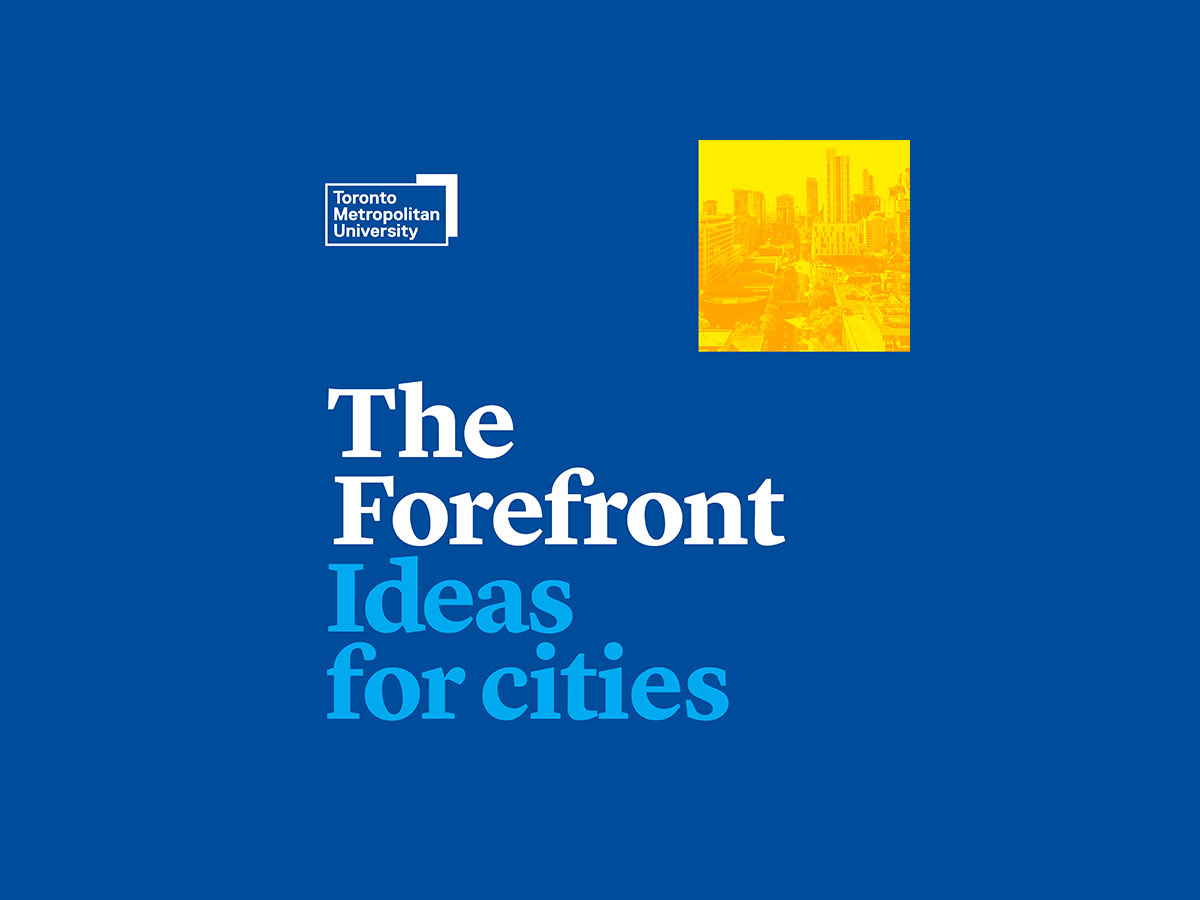Staying ahead of the “Curv”

Season 4, Episode 4
Description
The job market is changing at a rapid speed, making it difficult for both those looking to get hired and for those doing the hiring. How can we address this skills gap?
In this episode, we speak with Matt McInnis, an educational technology leader, and with Gary Hepburn, dean of The Chang School, about microcredentials: a skills-based training and certification program developed in partnership with industry to help workers master the skills that employers need.
Spotify
Apple Podcasts
Amanda Cupido: This is The Forefront, a Toronto Metropolitan University podcast that explores ideas for cities. I’m Amanda Cupido.
So here’s the problem: the job market is changing at an unprecedented speed. There are a lot of emerging technologies that require both soft and hard skills. It can be difficult for both those looking to get hired—and those doing the hiring.
In 2021, Stats Canada reported that more than half of Canadian businesses said their workforce was not fully proficient to perform jobs at the required level. And according to Monster.com’s 2022 Future of Work report, a whopping 91% of employers said they were struggling to fill positions because they just couldn’t find a qualified candidate. Researchers are calling this phenomenon the “skills gap.”
The skills gap can partially be traced back to the pandemic, which forced employers to embrace digital tools and new workflows as people transitioned to remote work. But that’s just one data point in a larger trend. The skills we need in the workplace are changing faster every day.
Matt McInnis: My career has largely been focused around removing barriers in education.
Amanda Cupido: That’s Matt McInnis. He’s the CEO of a company called Typist, which develops educational technology to help students work on their keyboarding skills.
Matt McInnis: I spent a number of years as a math professor in our community college system. And I learned that there are a large number of students in our community colleges who have limited experience with technology at all, who take courses in computer keyboarding. And those tend to be very high failure rate courses in some cases.
Amanda Cupido: Seeing these gaps as an educator inspired Matt to create a resource for people looking to learn. But as a business leader, he’s come to understand the importance of upskilling in an entirely new way.
Matt McInnis: There’s a really, really high rate of change in tech and that affects every level of running a tech company.
Amanda Cupido: Matt says businesses are built on all kinds of skill sets. In his case, that includes developers, AI experts, user interface designers, user experience specialists, and the list goes on.
Matt McInnis: And the skills in all of those areas have changed enormously even in the last 2 to 3 years. So for us to continue to lead, we need to, not just evolve, but we need to keep our skills up and we need to be at the cutting edge and importantly, make the right decisions about where to upskill.
Amanda Cupido: But he says finding people with those skill sets is not always easy. Even though there tends to be a lot of people applying.
Matt McInnis: There’s this expression that if you post a job, whether it’s on LinkedIn or Indeed or internally on your own website, you’re immediately hit with this resumé tsunami. And it’s literally 700 of them that just land on you within five days. And then we have this very real challenge of trying to comb through that to find the best candidate.
Amanda Cupido: According to Monster.com, more than half of the workforce is at least open to finding a new job, if not actively searching and applying. That’s a lot of competition.
So from Matt’s perspective as an employer, the question is: out of all of these applicants, how do I figure out who has the skills we need?
Matt McInnis: We want somebody who is a generalist, but that’s deep in one area, and addressing that in hiring processes is often very difficult.
There are large numbers of people with skill sets that are difficult to distinguish from one another. They, whether it’s graduates of degree programs or bootcamp graduates or otherwise, it makes it very, very challenging to try to find talent when on paper the experiences are just so similarly represented.
Amanda Cupido: So if you’re a new grad, or someone looking to make a career change, you have to figure out a way to stand out from the crowd…while also demonstrating that you have the skills to do the job well.
It’s a tricky problem—and it’s not just job seekers and employers that are worrying about it.
Gary Hepburn: We’re in, you know, a really fast moving economy. We hear lots about skill gaps and skill shortages.
Amanda Cupido: That’s Gary Hepburn. He’s the dean of The G. Raymond Chang School of Continuing Education at TMU.
Gary Hepburn: And what we want to do is really begin to contribute to plugging those gaps and doing something that employers can count on because, you know, hiring is difficult and it’s difficult to be confident in decisions that are made.
Amanda Cupido: In 2023, The Chang School launched a new program that’s designed to help adult learners showcase their skill sets. It’s called Curv Microcredentials.
If you’ve never heard of a microcredential, it’s a short, skill-based certification that helps students deepen their expertise in a specific area. Basically, you spend a few hours working on a particular skill, with feedback from an instructor, and then you do an assessment that allows you to put your new skill into action.
Here’s an example.
Gary Hepburn: I did one on accessible Word documents. I learned about the attributes of successful Word documents, but more importantly, how to make Word documents accessible, how to actually do it. And then they gave me a Word document that had many problems from an accessibility standpoint. And during the time of the assessment, I was to correct each one of these.
Amanda Cupido: Gary says the assessment at the end isn’t a traditional exam. There’s no multiple choice questions or essays. Microcredentials are focused on practical skills.
Gary Hepburn: We’re not doing a course that really becomes a proxy for a number of skills that may be contained within the course. This is actually what we’ve called often precision upskilling. So it does give that actual demonstration and produces a TMU credential that is awarded when a student is successful on one of our assessments.
Amanda Cupido: These super specific learning opportunities are all developed in consultation with real employers, like Matt. According to Gary, checking in with the people who do the hiring allows The Chang School to put together a fair assessment from a career standpoint.
And then, at the end, you don’t just get an extra line on your resumé or a traditional certificate in the mail. You actually get a digital credential.
Gary Hepburn: Clicking on it will take an employer back to look at the some data that is attached to it, which actually does describe the skill or competency that we did assess and how we did that.
Amanda Cupido: So when it comes to submit your resumé, or update your LinkedIn page, you can link to your microcredential—and prospective employers can see exactly what you learned.
Gary Hepburn: The transparency of the microcredential is one of the strongest assets.
Amanda Cupido: Matt would agree with that sentiment. Microcredentials offer a look into the candidate’s practical education and also there is a bit of a different energy with the students compared to those working towards an undergraduate degree.
Matt McInnis: You know when you go and you talk to third or fourth year degree students and you say, do you think your employers are going to look at your grades? You get this really surprising answer. They say, “yeah, of course they are. They’re of course, they’re going to look at my grades!” But we of course, we don’t. You don’t even list the courses that you take on that. And so it’s from an employer perspective, it’s hard to know what the student studied or excelled at.
Amanda Cupido: Matt says that a candidate with a relevant microcredential on their application can cut through the noise of the application process. Especially when employers are looking for skills in innovative new fields that might not have made their way into traditional degree programs just yet.
The Chang School offers Curv Microcredentials on topics such as project management, understanding data, and digital accessibility. They’re also in the process of diving into a wider range of fields—including AI in the workplace.
Matt McInnis: We haven’t seen anything like this particular skill work its way back into education and just generally people’s skill sets before. It’s unfamiliar and it’s kind of weird when you engage with it. So it makes it really ripe for a microcredential in that, you know, learning how to do it well can result in big productivity gains on the back side.
Amanda Cupido: Gary says that these are the kinds of topics that are best suited to microcredentials: hyper specific, hands on, and changing quickly. And these are things he wants The Chang School to be known for.
Gary Hepburn: We’d like them to be very certain that when they see that a microcredential is awarded by The Chang School, that they are very confident that that potential employee would indeed have that skill.
Amanda Cupido: For Matt, a microcredential on a resumé isn’t just a reliable indicator of knowledge and skills. It’s also indicative of a quality he’s always looking for in new hires: the desire to keep learning.
Matt McInnis: You can’t say, hey, you know, are you a curious person? We know that that doesn’t work well. That’s not a really good way to figure that out. So we look for other things, and one of my favourite signals to try to find those people who are entrepreneurial or innovative or have that commitment to lifelong learning is to see when the education stopped, did you continue learning?
Amanda Cupido: Matt believes that lifelong learners make great employees because they tend to be creative, innovative, and ambitious—all great attributes to have on your team.
Matt McInnis: When I see any indication of lifelong learning on a resumé, that resumé goes to the top of the pile, and that could be in the form of something that they created. It could be volunteerism. It could be a course that they took on a third party course website. It could be a microcredential. Just any sort of signal that they have continued learning in any domain has always, at least in my experience, resulted in us hiring a great person.
Amanda Cupido: Before we go, here’s Dean Gary Hepburn again about why he’s proud to be part of TMU.
Gary Hepburn: It’s a bold university, city builder, and really wants to contribute to the growth and evolution of the city of Toronto. So there’s certain energy and belief at TMU. The Chang School gives us a special opportunity to serve adult learners, and I do believe this has been an underserved group in the past. There is an educational problem out there and we’re trying to present a solution. And I consider that very exciting work and feel very grateful and privileged that I get to do this and on a day to day basis, and I hope it works really well for learners and employers.
Amanda Cupido: This podcast was created for alumni and friends by University Advancement at Toronto Metropolitan University. Special thanks to our guests on today’s episode: Matt McInnis and Dean Gary Hepburn. This podcast was produced by me, Amanda Cupido, and Emily Morantz. Katia Galati was the editor for this episode—and we’re all proud grads of TMU! The support team from the university includes Betty Quan, Haweya Fadal, Meredith Jordan, and Krishan Mehta. To learn more about The Chang School or microcredentials, and for more episodes of this podcast and others, visit torontomu.ca/alumni/podcasts.

The Forefront is a proud recipient of the Canadian Online Publishing Awards for Best Podcast in 2023 (silver).

The Forefront is a proud recipient of the Canadian Council for the Advancement of Education (CCAE) Prix d’Excellence Award.
